MPA英语教学大纲
公共管理专业英语
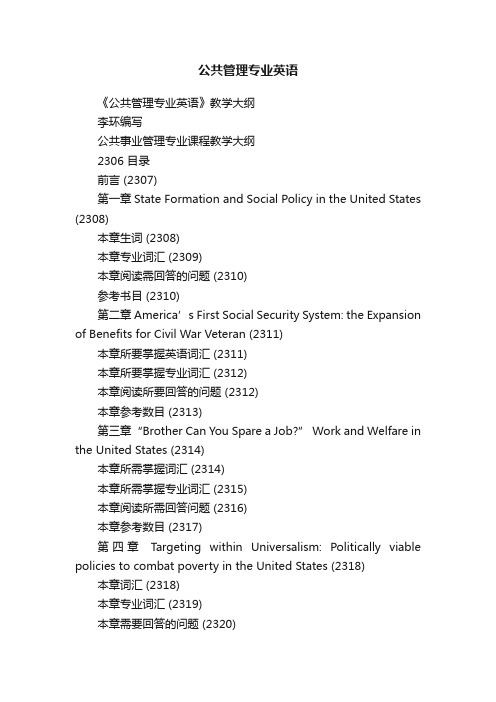
公共管理专业英语《公共管理专业英语》教学大纲李环编写公共事业管理专业课程教学大纲2306 目录前言 (2307)第一章State Formation and Social Policy in the United States (2308)本章生词 (2308)本章专业词汇 (2309)本章阅读需回答的问题 (2310)参考书目 (2310)第二章America’s First Social Security System: the Expansion of Benefits for Civil War Veteran (2311)本章所要掌握英语词汇 (2311)本章所要掌握专业词汇 (2312)本章阅读所要回答的问题 (2312)本章参考数目 (2313)第三章“Brother Can You Spare a Job?” Work and Welfare in the United States (2314)本章所需掌握词汇 (2314)本章所需掌握专业词汇 (2315)本章阅读所需回答问题 (2316)本章参考数目 (2317)第四章Targeting within Universalism: Politically viable policies to combat poverty in the United States (2318) 本章词汇 (2318)本章专业词汇 (2319)本章需要回答的问题 (2320)本章参考书目 (2320)第五章Gender and the Origins of Modern Social Policies in Britain and the United States (2321)Questions to answer (2322)本章参考书目 (2323)公共管理专业英语前言课程性质:本课程是针对具有一定的公共管理专业知识,同时具备一定的英语水平(四级以上)的学生而开设的。
《专业学位硕士研究生基础英语》课程教学大纲
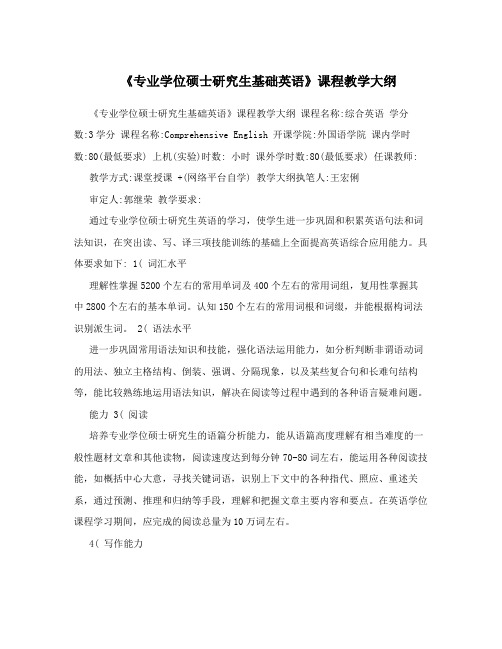
《专业学位硕士研究生基础英语》课程教学大纲《专业学位硕士研究生基础英语》课程教学大纲课程名称:综合英语学分数:3学分课程名称:Comprehensive English 开课学院:外国语学院课内学时数:80(最低要求) 上机(实验)时数: 小时课外学时数:80(最低要求) 任课教师: 教学方式:课堂授课 +(网络平台自学) 教学大纲执笔人:王宏俐审定人:郭继荣教学要求:通过专业学位硕士研究生英语的学习,使学生进一步巩固和积累英语句法和词法知识,在突出读、写、译三项技能训练的基础上全面提高英语综合应用能力。
具体要求如下: 1( 词汇水平理解性掌握5200个左右的常用单词及400个左右的常用词组,复用性掌握其中2800个左右的基本单词。
认知150个左右的常用词根和词缀,并能根据构词法识别派生词。
2( 语法水平进一步巩固常用语法知识和技能,强化语法运用能力,如分析判断非谓语动词的用法、独立主格结构、倒装、强调、分隔现象,以及某些复合句和长难句结构等,能比较熟练地运用语法知识,解决在阅读等过程中遇到的各种语言疑难问题。
能力 3( 阅读培养专业学位硕士研究生的语篇分析能力,能从语篇高度理解有相当难度的一般性题材文章和其他读物,阅读速度达到每分钟70-80词左右,能运用各种阅读技能,如概括中心大意,寻找关键词语,识别上下文中的各种指代、照应、重述关系,通过预测、推理和归纳等手段,理解和把握文章主要内容和要点。
在英语学位课程学习期间,应完成的阅读总量为10万词左右。
4( 写作能力掌握基本写作技能(如写出通顺的语句,学会运用起承转合),利用各种基本技巧进行描述、叙事、说明、论证,抓住要点,表达自己的思想。
能按具体要求,在一小时内写出250—300词的短文(如论文摘要、应用文或描述常见图形图表内容等),语意连贯,无重大语法错误。
5( 翻译能力1) 英译汉:能借助词典,将难度一般的科普文章译成汉语,理解正确,译文通顺达意。
公共管理专业英语 顾建光 教学大纲
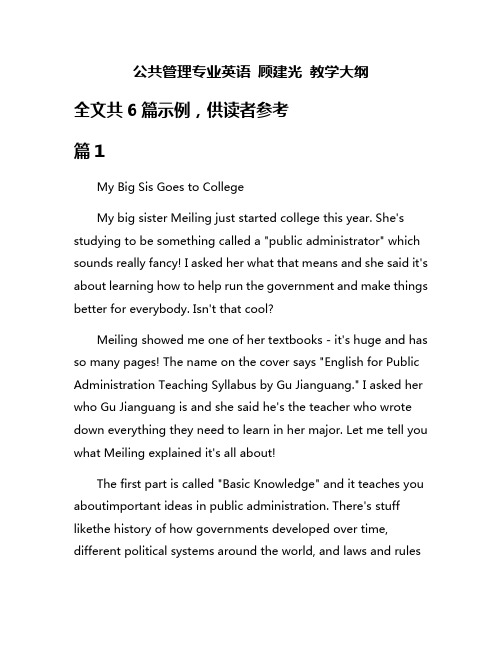
公共管理专业英语顾建光教学大纲全文共6篇示例,供读者参考篇1My Big Sis Goes to CollegeMy big sister Meiling just started college this year. She's studying to be something called a "public administrator" which sounds really fancy! I asked her what that means and she said it's about learning how to help run the government and make things better for everybody. Isn't that cool?Meiling showed me one of her textbooks - it's huge and has so many pages! The name on the cover says "English for Public Administration Teaching Syllabus by Gu Jianguang." I asked her who Gu Jianguang is and she said he's the teacher who wrote down everything they need to learn in her major. Let me tell you what Meiling explained it's all about!The first part is called "Basic Knowledge" and it teaches you aboutimportant ideas in public administration. There's stuff likethe history of how governments developed over time, different political systems around the world, and laws and rulesthat officials have to follow. Meiling says it's really interesting learning about how countries are organized and run.Next there's a section on "Professional Knowledge" which gets into thehands-on skills you need to actually work in public administration. This includes how to manage people and projects, use computers for official businesses, write formal documents, and communicate clearly both in speaking and writing. Meiling jokes that she'll basically be training to become a super-organized boss lady!But the biggest part is "English Language Application" since communicating in English is super important for this major. Meiling has to take classes on English reading, writing, listening, and speaking - all focused on the public administration field. She showed me some sample materials which looked pretty hard, with longofficial documents, speechesbyimportant leaders, and dialogue scripts of meetings and negotiations. No wonder English takes up so much of her studies!There are also some smaller sections likeacademic research methods to learn how to findreliable information and analyzeideas. Andsemesterprojects where the whole class has to work togetheron a public administration case study. Meiling saysthis helps prepare them for tackling realprojects after graduating.I got a little dizzy just from her explaining everything! To becomea public administration professional fluent inEnglish sure requires a TON of hard work. Meiling complains about allthe reading and assignments she has to do, but I can tellshe's reallymotivated. She keepsreminding me how this major will allowher to get a good job serving our country and community after college.I'm just awideeyed kid but learnin gabout her super intense program made me respectall the difficult yearsof education topreparemybigsisfor her dream career. I don'tenvy all her heavy textbooks andtough classes, but I totally admire her commitment! I'm alreadyso proudof Meiling eventhoughshe's juststarted.Wheneverfeelexhausted fromstudying, I hopeshe remembershowunsungpublic servants arethe realheroes improving citizens' daily lives.Eventhoughpublic administrationEnglish sounds crazy complicated withitshuge syllabus,I know my amazing sis haswhatitrequires to succeedbythetime she dons that graduation cap! I can't wait toattendher commencement and seewhere her journeyleads next.Good luck,MeiMei - I'll be cheering foryou everystepof the way!篇2Hi there friends! Today we're going to learn about a very important subject called Public Administration English. It's all about how the government works and how to communicate with people in charge. Let me tell you a fun story to help explain!Once upon a time, there was a town called Smileyville where everyone was always happy. But one day, the townsfolk realized they needed some new rules to keep things running smoothly. "We need leaders!" they all cried.So they held a big election and chose a wonderful woman named Mayor Lily to be in charge. Mayor Lily was very smart, but she didn't speak the same language as some of the people in Smileyville. This made it hard for her to understand what everyone needed.That's when a wise teacher named Mr. Gu stepped in. "I can teach Mayor Lily and her team how to speak and understand all the languages in Smileyville!" he said. "It's called Public Administration English."Mr. Gu's first lesson was on speaking clearly. He taught Mayor Lily words like "policy" for the rules she would make, and "administration" for how she would get things done. He helped her practice giving speeches so everyone could understand.Next, Mr. Gu taught about reading and writing important papers. Mayor Lily had to read lots of "reports" with information to help her make decisions. She also had to write "proposals" to share her ideas and get approval.But talking and writing weren't enough - Mayor Lily also needed to learn how to listen carefully. Mr. Gu showed her how to pay close attention when people spoke at "meetings" so she could understand what they wanted or needed.As Mayor Lily kept practicing her new skills, things in Smileyville got even better! She could communicate with all the bakers, builders, teachers and everyone else. Nobody felt left out or ignored.Some days, Mayor Lily's work was easy. But other days, it was really hard! Like when two groups couldn't agree and started arguing.That's when Mr. Gu taught about resolving conflicts through communication. Mayor Lily learned to ask lots of questions,listen patiently, and rephrase what she heard so there were no misunderstandings. Then she could suggest "compromises" or ways for both sides to be happy.There was so much more to learn in Public Administration English! Like using proper email manners when sending "correspondence." And giving clear "briefings" to share updates. And understanding all the legal "terminology" for laws and rules.Whenever things got confusing, Mr. Gu reminded Mayor Lily, "The most important thing is to communicate clearly, openly and with respect for all people. That way, you can serve the public good."With her new language skills, Mayor Lily became the best leader Smileyville could ever want! She brought the community together and helped make everyone's life better.Years later, Mayor Lily retired feeling very proud. And you know what? She decided to follow in Mr. Gu's footsteps and teach Public Administration English to future leaders!The end! So you see, learning this subject is super important for anyone who wants to work for the government and help make their community or country a wonderful place.Just like Mayor Lily, you'll learn all the words and skills to manage cities, write rules, handle disagreements, and effectively serve the public. Mr. Gu's lessons will teach you how to communicate clearly in any situation a leader might face.It won't be easy - Public Administration English takes a lot of practice. But if you study hard, one day you could be the next great mayor, governor or public servant making positive changes! Just remember to always listen to all perspectives and bring people together. That's what it's all about.I hope my story helped explain why this subject matters. Learning it will open up so many future opportunities! What did you think of my tale of Smileyville? Let me know if you have any other questions!篇3Hello friends! Today I want to tell you about a really cool class I'm taking at university. It's called "Public Administration English" and it's taught by Professor Gu Jianguang. He seems like a nice guy with glasses and a friendly smile.The first week, Professor Gu gave us the syllabus which is a big list of everything we're going to learn about this semester. I have to be honest, some of the words were really hard for me tounderstand at first! But I'll do my best to explain it in simple terms.Basically, public administration is all about how the government works and makes decisions to help people. In this class, we'll learn lots of important English vocabulary related to government, economics, law, and public policy. That way if we get jobs working for the government someday, we'll know all the right English words to use!One of the first units we'll cover is about the structure and functions of government. We'll learn words like "legislation," "judiciary," and "executive branch." Those all refer to different parts of government that make laws, interpret laws, and enforce laws. It's kinda like learning about the different parts of a big machine!Then we'll move on to discussing public policy issues. Professor Gu says we'll read lots of articles and have debates about hot topics like environmental protection, healthcare, education reform, and more. We'll need to learn vocabulary related to those different policy areas. I'm most excited about the environmental unit because I really care about taking care of the planet!Another major part of the class will be economic and financial vocabulary. We'll cover economic concepts like GDP, inflation, taxation, and government budgeting. I have to admit, those economic terms already have my head spinning a bit! But Professor Gu promises to explain everything clearly. Apparently understanding money and finances is really important for public administration.Later in the semester, we'll dive into public management principles. That means learning about how to effectively lead and manage operations within a government organization. Some of the key vocabulary will be related to organizational structure, human resources, performance evaluation, andethics/accountability. Those all seem like important things for future government leaders to know about.One whole unit will focus on international relations and global governance structures. With so much happening between different countries and organizations worldwide, public administrators need a strong grasp of geopolitical vocabulary in English. We'll read about the United Nations, multinational companies, international trade agreements, and more. It sounds fascinating but also pretty complex!Towards the end of the course, we'll have opportunities to practice our new vocabulary through case study analysis, policy memo writing, and simulated meetings/negotiations. Professor Gu says those practical exercises will prepare us for real-life public administration scenarios where we'll need to use precise English terminology.Whew, I think that covers most of the major topics we'll be learning! As you can probably tell, this Public Administration English class will take a lot of hard work and brain power. But I'm really excited to build my English skills and learn so much about how governments operate.Professor Gu seems like he'll be an awesome teacher to guide us through everything. And who knows, maybe someday I'll have an important government job helping create policies to make the world a better place! But first I need to study really hard in this cool class. Wish me luck!篇4Mr. Gu's Fun Class for Learning About Helping People!Hi everyone! My name is Gu Jianguang, but you can call me Mr. Gu. I'm really excited to teach you all about public administration this year. That's a big fancy word that meanslearning how to manage things that help communities and societies.In my class, we're going to learn so many cool and important things! We'll talk about laws and rules that keep people safe. We'll explore how governments make decisions on important issues. And we'll see how hard-working people in public service jobs help make our towns, cities and countries better places.Get ready for an awesome year of learning, games, activities and even some field trips! Here's what we'll be covering:Unit 1: What is Public Administration?We'll start by understanding just what public administration means. It's all about managing public policies, programs, resources and employees for the greater good of the public. We'll learn the difference between the public and private sectors too.Unit 2: The Role of GovernmentGovernments play a huge part in public administration. We'll examine how governments at the local, regional and national levels operate. We'll discuss voting, democracy, public decision-making and the branches of government like the courts, legislature and public agencies.Unit 3: Public Policies and ProgramsThere are so many policies and programs run by governments to help citizens. We'll explore areas like education, healthcare, transportation, environment, public safety and more. We'll see how these policies get created and implemented to address public issues.Unit 4: Managing Public ResourcesGovernments have to be really careful about managing money, materials, buildings and other resources that are funded by taxes from citizens. We'll learn principles of budgeting, finance, procurement and asset management so resources are used properly.Unit 5: The Public WorkforceLots of hard-working people are employed by the government to serve the public good. We'll study topics like public personnel systems, employee training, workplace rules, motivation and public service values. We want public employees to do their jobs well!Unit 6: Performance MeasurementIt's important to check that public policies and programs are working effectively. We'll discover ways to analyze data, measureoutcomes and ensure accountability so administrations can continuously improve their performance.Unit 7: Ethics and AccountabilityPublic servants have a duty to be ethical, transparent and accountable to the people they serve. We'll go over principles like integrity, impartiality, professionalism and respect for things like human rights and the environment.Unit 8: Modern ChallengesFinally, we'll examine some of the big challenges facing public administrations today and in the future. This could include technology, globalization, social equity and sustainable development among other critical issues.Wow, that's going to be such an fascinating year! I'll use all kinds of fun activities to make this topics engaging. We'll have group projects, interesting guest speakers, field trips and interactive games and debates. We may even take a field trip to visit some local government offices.My goal is for you to really understand the important work of public service and administration. The policies, decisions and work done by governments and public agencies impacts every part of our lives. With the knowledge from this class, somedaysome of you may even want to become public leaders and civil servants yourselves!I'm super excited to explore this all with you. Get ready for an amazing journey into the world of public administration. If you have any other questions, just let me know. Let's make this the best class ever!篇5Hi friends! Today I want to tell you all about this really cool class I'm taking called English for Public Administration. It's taught by Professor Gu Jianguang, who is super nice and really good at explaining things.The first thing we learned about is what public administration actually means. It's all about how the government works and makes decisions to serve the people. The professor said public administration is like the brain that runs the body of the government! Pretty neat, right?We spent a few weeks talking about the history of public administration and how it has changed over time. Way back in ancient China, there were already government officials and systems in place to manage things like taxes, construction projects, and laws. Can you imagine being a kid back then andhaving to take notes with a brush and ink instead of a pencil? No thanks!Then we learned about public administration in other parts of the world too, like ancient Greece and Rome. Those crazy Romans really knew how to build roads and aqueducts. The professor showed us pictures and everything. We even got to look at replicas of old government documents - so cool!But of course, a lot has changed since those ancient times. Now we have modern governments with elaborate bureaucracies and civil services. We talked about how public policies get made, implemented, and evaluated nowadays. There sure are a lot of processes and procedures involved!The professor also taught us about important theories in public administration like scientific management, bureaucratic theory, and New Public Management. I'll be honest, some of those theories gave me a headache trying to understand them at first. But Professor Gu is really patient and would explain things again in a simpler way when we got confused.You know what was fun though? Doing role-playing activities where we pretended to be government officials having meetings and making decisions. We got to practice our English speaking and writing skills while learning about publicadministration concepts like budgeting, human resources, and organizational behavior. Definitely brought the lessons to life!Another big part of the class was comparing public administration in different countries and regions. We looked at case studies from the US, UK, China, and other places to see the similarities and differences in how their governments operate. Made me appreciate how diverse the world is!One of my favorite units was on digital governance ande-government services. It was mind-blowing learning about all the ways technology is transforming how the public sector operates and delivers services nowadays. Websites, apps, AI, big data - it's like living in the future!We also covered some global issues in public administration like environmental policies, crisis management, and how different countries cooperate on things that affect the whole world. Yeah, it got a little heavy at times, but I feel like I have a much better understanding of how interdependent we all are on this planet.Throughout the whole class, we were constantly practicing our English skills - reading articles and reports, writing policy memos and briefings, giving presentations, you name it.Professor Gu really emphasized how vital English proficiency is for anyone wanting a career in this field.Oh, and I can't forget to mention the group project we did at the end of the term! Our team had to analyze a real public administration issue and propose a policy solution, all while writing reports and communicating with each other in English. It was a ton of work but also crazy fun.I learned sooooo much from this class. Not just about public administration concepts, but how to think critically, conduct research, communicate effectively, and work collaboratively. Professor Gu really made the topics come alive in an engaging way.If any of you kids out there are interested in how governments work and want to make a positive difference in your community, I highly recommend taking this English for Public Administration course when you're older. Who knows, you might even grow up to become an awesome public servant one day!Okay, that's all for my extremely detailed and fascinating summary (or maybe not, haha!). Thanks for reading, friends! Time for me to go play some video games and be a kid again. Bye!篇6Hi kids! Today we're going to learn about a really cool class that some big kids take called "Public Administration English" taught by Professor Gu. It's all about how to use the English language to help make our communities and government work better for everyone!First up, we'll learn about the different jobs people can have working for the government. There are leaders like mayors and governors who help make important decisions. There are public servants who do things like teach at schools, put out fires, keep people safe as police officers, and collect trash. We'll learn the English words for all these roles.Next, we'll practice how to read and write different kinds of official documents and letters in English. Things like policies, reports, meeting notes, and emails that government workers use every day. It's important to communicate clearly so everyone understands!Then we get to dive into how the government operates at different levels - from your local city all the way up to the national government. We'll learn fancy words like "municipal", "provincial", "federal", and more. We'll discuss the differentdepartments that focus on areas like education, transportation, healthcare, and the environment.One of the most interesting units is about public policy. That means the plans and laws that leaders put in place to support things that benefit everyone, like parks, libraries, roads, and social services. We'll look at examples of good public policies and think about how we could make them even better.Another fun part is learning how to give professional presentations in English. You'll practice speaking clearly and making slides with information to share your brilliant ideas for improving our communities. Public speaking can benerve-wracking, but with practice it gets easier!Throughout the class, we'll read real documents from government agencies and watch videos of leaders giving speeches. We'll have big group discussions about important issues our cities and countries are facing. We can debate different solutions and think critically about what is fair for all people.There will be lots of opportunities to practice your English writing too. You might have to write letters, essays, reports and more - just like grown-up government workers do. Don't worry,Professor Gu will give you plenty of feedback to help you improve.One of the biggest challenges will be learning all the specific vocabulary related to public administration and organizational management. Words like "policy", "jurisdiction", "constituency", and "municipal" can be tongue-twisters at first! But keeping a vocabulary journal and using the new words repeatedly will make them stick.My favorite part of the class is the field trips! You might visit a mayor's office to see how city decisions get made. Or a police station to learn about law enforcement. Or even attend a town hall meeting where citizens can voice their opinions. It's so cool to see real-life public administration in action.By the end of Professor Gu's class, you'll know how to communicate clearly about all the different parts of public service that keep our communities running smoothly. You'll be ready to go out and be a leader - whether that's student council president or maybe even the future mayor of your town!I know that was a ton of information, but don't be overwhelmed. Professor Gu makes it all super interesting and fun. As long as you come to class ready to learn, participate in the activities, and do your homework, her Public AdministrationEnglish course will be a blast. Who's ready to go out and change the world?!。
《行政管理专业英语》课程教学大纲

《行政管理专业英语》教学大纲Public Management English Reader一、课程性质、目的与要求课程性质:限选。
课程目的:通过熟练掌握专业英语的相关词汇与术语和翻译的训练,巩固学生的专业知识。
查阅本专业世界范围内的最新研究成果,培养学生查阅英文专业文献的能力,提高他们直接 用外语获取相关专业知识的能力。
教学要求:要求通过本课程的学习,培养学生阅读、翻译专业英文书刊的能力,训练学生进 行简单的日常专业英语对话、看懂有关专业英语报刊材料和书写有关专业内容的英文文章的 能力。
并能以英语为工具,获取本专业所需的国际发展信息。
二、教学内容理论总学时:40学第一章:公共管理概述 时基本要求:了解公共管理概念的不同表述方式及看法,分别从管理、政治和法律的角度来体 会公共管理的内涵,同时了解公共管理的诸多因素,体会新公共管理与传统的行政管理的区 别。
重点:新公共管理。
难点:公共管理的价值导向。
第二章:电子政务与公共管理变革4学基本要求:了解网络技术的发展对公共管理带来的挑战和机遇和电子政务的基本内容,主要 掌握电子政务在提高政府办公效率的同时所带来的问题。
重点:电子政务的基本内容。
难点:电子政务的问题。
第三章:行政法4学时基本要求:了解行政法的定义、产生背景及相关法学流派的主要观点,主要掌握行政法的一 些适用专业: 行政管理(高级秘书)课程编号:3402512 前修课程: 行政学学分:3 总学时:.48基本原则,体会对行政权加以监控的重要性。
重点:法治原则、三权分立原则、司法审查原则。
难点:行政权的监控手段。
第四章:公共经济4学时基本要求:理解外在性的含义、正的外部性与负的外部性,并能举例加以说明,了解导致外在性的一般原因,掌握外在性的主要类型。
重点:导致外在性的一般原因。
难点:外在性的主要类型。
第五章:公共物品4学时基本要求:掌握公共物品的定义和公共物品的两个基本特征,了解什么是纯公共物品与准公共物品。
《公共事业管理专业英语》课程教学大纲
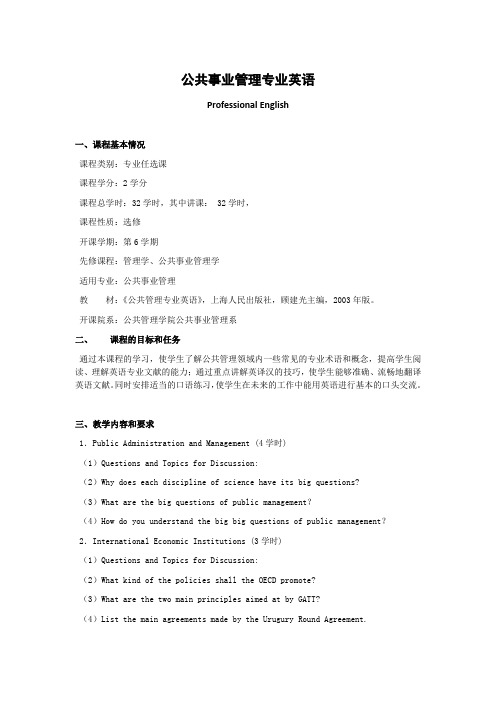
公共事业管理专业英语Professional English一、课程基本情况课程类别:专业任选课课程学分:2学分课程总学时:32学时,其中讲课: 32学时,课程性质:选修开课学期:第6学期先修课程:管理学、公共事业管理学适用专业:公共事业管理教材:《公共管理专业英语》,上海人民出版社,顾建光主编,2003年版。
开课院系:公共管理学院公共事业管理系二、课程的目标和任务通过本课程的学习,使学生了解公共管理领域内一些常见的专业术语和概念,提高学生阅读、理解英语专业文献的能力;通过重点讲解英译汉的技巧,使学生能够准确、流畅地翻译英语文献。
同时安排适当的口语练习,使学生在未来的工作中能用英语进行基本的口头交流。
三、教学内容和要求1.Public Administration and Management (4学时)(1)Questions and Topics for Discussion:(2)Why does each discipline of science have its big questions?(3)What are the big questions of public management?(4)How do you understand the big big questions of public management?2.International Economic Institutions (3学时)(1)Questions and Topics for Discussion:(2)What kind of the policies shall the OECD promote?(3)What are the two main principles aimed at by GATT?(4)List the main agreements made by the Urugury Round Agreement.3.Information Technology and E-Government (5学时)(1)Questions and Topics for Discussion:(2)What is the real task of Palmer and his teamwork in the story of the article?(3)Why now is the business of the computer-business prosperous?(4)What are the useful mersure for preventing a hack attacker?4.Reginal and Urban Development (5学时)(1)Questions and Topics for Discussion:(2)Do you think it is possible to promote economic development while keeping its (3)environment impact at a minimum level?Why?(4)Please raise some factors which are constrainig the improvement of ubran environment management.Social Security and Community Development (6学时)(1)Questions and Topics for Discussion:(2)What means by directive and non-directive approaches to community development?(3)What is the aim of community development and how can it be achieved?(4)What is the main reason of the failing in community development?6.Public Health (5学时)(1)Questions and Topics for Discussion:(2)What is the role of public government in HNP sectors?(3)What can be done for enhancing performance of HNP services?7.Techonology and Education (4学时)(1)Questions and Topics for Discussion:(2)What is the core concept of a national policy when education is considered as a public good?(3)What are the main problem in education magament in your region or city?(4)How do you definite the role of the public and private sectors in education service provision?(5)What are being or will be brought about by ICT revolution in education sector?四、课程考核(1)教学方式:老师讲授、案例讨论与口语练习相结合。
MPA公共行政教学大纲

复旦大学《公共行政学》MPA课程教学大纲英文译名:Public Administration适用专业:MPA学分数:总学时数:一、本课程教学目的和任务1.目的:通过本课程的学习,旨在让学生了解公共行政的管理理论与实践,促进学生对公共行政的基本内涵和价值有更深的理解,并能利用所掌握的基本理论和技能提升现实中的公共行政实践管理活动。
2.任务:通过本课程的学习,充分了解公共行政管理的基本特征与内容;能熟练从事公共行政实践。
二、本课程的基本要求1.学习与思考公共行政的基本使命与过程,并提出自己的理解;2.参与课堂讨论,针对案例与问题进行思考,并积极发表自己的意见与看法;3.完成期中作业/项目管理设计;4.完成与教学主题密切相关的课程论文。
三、本课程与其他课程的关系(前修课程要求等)应在选修管理学、组织社会学、组织行为学、公共政策学、人力资源管理、政治学等课程的基础上,才能对本课程内容进行深入思考和研究。
四、课程内容(重点及必须掌握内容、章节加*号或另作说明;文字多请另加纸)* 导论:理解公共行政第一章行政组织*第二章行政领导*第三章行政决策/公共政策*第四章行政沟通*第五章行政心理*第六章行政监督第七章行政机关管理*第八章人事行政/公务员管理*第九章财务行政第十章行政立法*第十一章行政伦理第十二章行政文化第十三章行政发展相关章节案例讨论五、其它(如习题或作业、实验、上机、课程设计等内容和要求,根据实际安排按序编写)期中作业/项目管理设计六、选用教材及主要参考书(写明名称、编著者、出版社、出版时间)1、教材竺乾威教授主编《公共行政学》复旦大学出版社2008.2、参考书• 1. 邓小平《党和国家领导制度改革》1980年8月18日• 2.威尔逊《行政学研究》论文• 3.理查德·J·斯蒂尔曼II 《美国的公共行政研究:一门“实践性很强的科学”》4.罗伯特登哈特《公共组织理论》中国人民大学出版社,2005.• 5.福克斯《后现代公共行政》中国人民大学出版社,2002.• 6.(美)李,(美)约翰逊,(美)乔伊斯著《公共预算制度》上海财经大学出版社有限公司,2010年.•7.[美]理查德罗蒂.文化政治哲学[M].北京:北京大学出版社,2011.•8.[法] 托克维尔. 论美国的民主[M]. (上、下卷)北京: 商务印书馆,1996.•9.〔英〕J.S.密尔著代议制政府[M] 商务印书馆,1997。
硕士生公共英语教学大纲

课程编号:M090011硕士生公共英语General English Courses for Master Students一. 总学时:64 面授学时: 64 其它学时:二. 学分:3三. 先修课程:大学英语四. 教学目的:本课程坚持从实际出发、学以致用的原则,进一步提高学生英语综合运用能力及文化素质,使他们熟练掌握并运用英语这门工具,进行本专业的学习、研究和国际交流,适应社会经济发展和国际化进程的需要。
本课程将着力提高学生英语的输出能力,即说、写和译的能力:“说”不仅局限于一般的日常对话能力,还包括出席国际会议、发表学术观点、公开演讲等交流、交际能力。
“写”的能力也超出写作小品文、考试作文的圈子,还包括学术论文、各类应用文的写作能力。
“译”的能力强调有效查找英文文献及文献翻译能力。
五. 考核方式:(请注明各种类型所占比例)本课程考核由过程性评估和终结性评估组成,过程性评估包括平时作业及课堂表现(占10%)、口语能力(占10%);终结性评估包括期末课程综合考试(占80%) 。
期末综合考试由客观题和主观题两部分组成。
客观题部分(70%)选用北京市研究生英语学位统一考试试题的客观题部分,包括听力(20%)、词汇(10%)、完型填空(10%)和阅读理解(30%);主观题部分(30%)主要测试与本课程所学教材相关的内容,包括翻译(20%)和写作(10%)。
六. 课程主要内容:(请注明学时分配)本课程分为读写译课和听说课. 读写译课使用《研究生英语高级教程》,共14个单元,课堂内精讲其中10个单元,第4、9、12、14单元作为学生课后自学单元,老师检查其自学效果。
每一单元的课堂教学计划安排4个学时,老师根据课文难易程度灵活安排教学进度。
单元主题如下: Unit 1-Waking up from the American dream; Unit 2-Move over, big brother; Unit 3-When ancient artifacts become political pawns; Unit 5-The Rise of green building; Unit 6-At what cost beauty; Unit 7-How to prepare for a pandemic; Unit 8-Too much too soon; Unit 10-How to live and love in the 21th century; Unit 11-The global food crisis; Unit 13-The new science of happiness听说课使用《朗文英语听说教程》,共12个单元,每单元的教学内容安排2个学时。
英语

《英语》教学大纲一、课程名称:MPA英语英文名称:MPA English课程编号:C02二、总学时:72学时三、学分:4学分四、课程简介:MPA英语课程是根据全国公共管理硕士 (MPA) 专业学位教育指导委员会对MPA核心课程的要求设立的。
本课程将英语语言基础知识教学与公共管理专业知识教学有机结合起来,具有专业和英语两方面的知识和功能:一方面通过对专业文献的学习扩展学员的公共管理专业知识,另一方面通过听说读写译的训练提高英语技能。
课程目标是着重培养MPA学员在实际工作中应用英语的能力,对他们的职业有所帮助,学以致用。
五、教材:谭新娇主编.MPA 英语阅读教程.北京:中国人民大学出版社,2002年版.任林静编著.MPA英语听说教程.北京:中国人民大学出版社,2002年版.六、教学目的:通过本课程的学习,学员应能够:掌握一定数量的公共管理专业术语和词汇;提高阅读和理解公共管理专业文献的能力;提高用英文表达和讨论公共管理中的问题的能力;提高英汉互译及英文公文写作能力;提高学术性听力水平;提高对外交往中用英语会话、发言和讨论问题的能力和技巧等。
七、教学方法:根据MPA学员的特点,因材施教,为学生服务。
教师讲解、引导和学员参与相结合。
阅读以授课和课堂讨论形式为主;听说以学生提前准备为基础,在教师的组织和引导下,采取对话、小组讨论、演讲及辩论等多种形式,依照教材进行课堂练习。
八、考试方式:按照《山东大学公共管理硕士(MPA)研究生考试管理办法》的规定,采取闭卷考试,百分制,60分为通过。
课程总成绩(满分100分)由试卷卷面考试成绩、出勤与课堂互动参与成绩、作业成绩等三部分组成。
其中试卷卷面成绩、出勤与课堂互动参与成绩、作业成绩分别占该课总成绩的70%、20%、10%。
其中,试卷按70分(满分)命题,试卷卷面成绩、出勤与课堂互动参与成绩、作业成绩及课程总成绩均由任课教师评定。
笔试和口试相结合,期末考试和平时成绩相结合。
(完整版)公共管理课程教学大纲
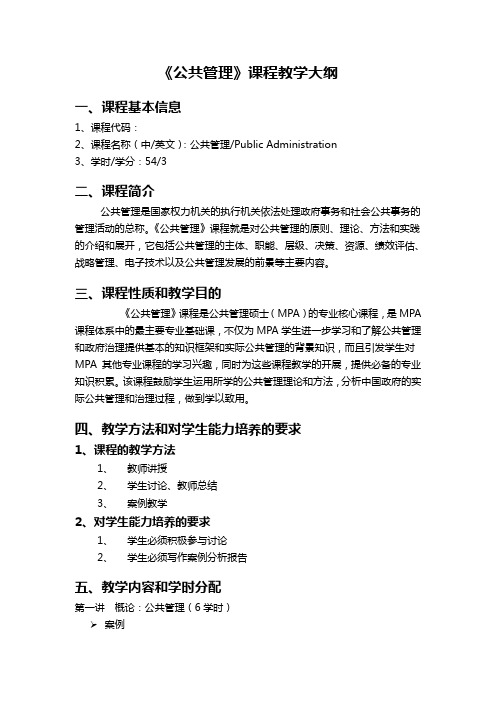
《公共管理》课程教学大纲一、课程基本信息1、课程代码:2、课程名称(中/英文):公共管理/Public Administration3、学时/学分:54/3二、课程简介公共管理是国家权力机关的执行机关依法处理政府事务和社会公共事务的管理活动的总称。
《公共管理》课程就是对公共管理的原则、理论、方法和实践的介绍和展开,它包括公共管理的主体、职能、层级、决策、资源、绩效评估、战略管理、电子技术以及公共管理发展的前景等主要内容。
三、课程性质和教学目的《公共管理》课程是公共管理硕士(MPA)的专业核心课程,是MPA 课程体系中的最主要专业基础课,不仅为MPA学生进一步学习和了解公共管理和政府治理提供基本的知识框架和实际公共管理的背景知识,而且引发学生对MPA 其他专业课程的学习兴趣,同时为这些课程教学的开展,提供必备的专业知识积累。
该课程鼓励学生运用所学的公共管理理论和方法,分析中国政府的实际公共管理和治理过程,做到学以致用。
四、教学方法和对学生能力培养的要求1、课程的教学方法1、教师讲授2、学生讨论、教师总结3、案例教学2、对学生能力培养的要求1、学生必须积极参与讨论2、学生必须写作案例分析报告五、教学内容和学时分配第一讲概论:公共管理(6学时)➢案例第二讲公共组织:公共管理主体(4学时)➢案例➢习题第三讲公共管理职能:理论与边界(4学时)➢案例➢习题第四讲公共管理层级:中央与地方关系(4学时)➢案例➢习题第五讲公共管理决策:形成与运行(4学时)➢案例➢习题第六讲公共人力资源管理:理论与完善(4学时)➢案例➢习题第七讲公共管理部门:现状与改革(4学时)➢案例➢习题第八讲公共管理部门绩效评估:类型与方法(4学时)➢案例➢习题第九讲公共部门战略管理:理论与借鉴(4学时)➢案例➢习题第十讲非政府公共管理:中介组织的发展(4学时)➢案例➢习题第十一讲基层公共管理:社区发展(4学时)➢案例➢习题第十二讲公共管理的新领域:E政府(4学时)➢案例考试(含复习)(4学时)六、课程的考核办法和评分标准1、考核办法:讨论+案例+堂上开卷2、评分标准:讨论20%+案例报告30%+卷面50%七、课程的教材和参考资料教材:陈振明主编:《公共管理学原理》,中国人民大学出版社,2003年。
公共管理专业英语课程教学大纲

《公共管理专业英语》课程教学大纲一、《公共管理专业英语》课程说明(一)课程代码:03130013(二)课程英文名称:English of Public Management & Administration(三)开课对象:公共事业管理本科专业(四)课程性质:本课程是针对公共管理与公共行政专业高年级学生所开设的专业基础课程。
其目的是通过对公共管理与公共行政原版经典教材的阅读、分析、比较和研究,一方面提高学生阅读原汁原味英文专业书籍的能力、培养英语思考的思维方式;另一方面,使学生加深对公共管理与公共行政基本概念、术语、原理和典范的深层次的理解,从而掌握国外公共管理与公共行政的发展脉络,把握最新的国际信息和理论动态。
随着改革开放的日新月异,学习好公共管理与公共行政专业英语是促进对外交往和学术交流的唯一手段与路径,也是每一个公共管理与公共行政专业的学生必须具备的基本素质。
前期课程有《大学公共英语》、《公共管理原理》、《社会学》、《政治学》。
(五)教学目的:通过对公共管理与公共行政原版经典教材的阅读、分析、比较和研究,一方面提高学生阅读原汁原味英文专业书籍的能力、培养英语思考的思维方式;另一方面,使学生加深对公共管理与公共行政基本概念、术语、原理和典范的深层次的理解,从而掌握国外公共管理与公共行政的发展脉络,把握最新的国际信息和理论动态。
(六)教学内容:本课程主要包括传统的公共行政模式、新公共管理、政府的角色、公共企业、公共政策与政策分析、战略管理、金融管理、人事和绩效管理、电子化政府等内容。
通过教学的各个环节使学生达到各章中所提的基本要求。
(七)学时数、学分数及学时数具体分配学时数: 72学时学分数: 3 学分(八)教学方式本课程主要采取学生课外预习、教师课堂讲授方式,适当结合多媒体教学,穿插案例教学,部分章节学生课外自学。
(九)考核方式和成绩记载说明本课程为考试科目。
学生在平时教学中应积极思考、参与课堂讨论、认真预习、做好笔记,完成老师布置的课内外作业。
MPA英语教学大纲
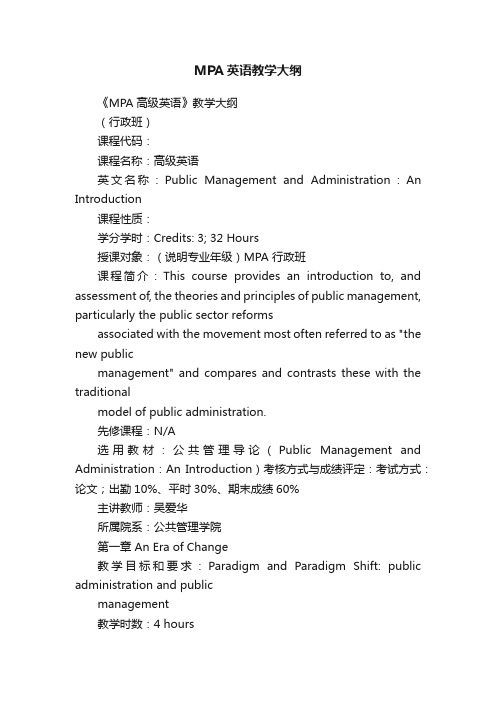
MPA英语教学大纲《MPA高级英语》教学大纲(行政班)课程代码:课程名称:高级英语英文名称:Public Management and Administration:An Introduction课程性质:学分学时:Credits: 3; 32 Hours授课对象:(说明专业年级)MPA 行政班课程简介:This course provides an introduction to, and assessment of, the theories and principles of public management, particularly the public sector reformsassociated with the movement most often referred to as "the new publicmanagement" and compares and contrasts these with the traditionalmodel of public administration.先修课程:N/A选用教材:公共管理导论(Public Management and Administration:An Introduction)考核方式与成绩评定:考试方式:论文;出勤10%、平时30%、期末成绩60%主讲教师:吴爱华所属院系:公共管理学院第一章 An Era of Change教学目标和要求:Paradigm and Paradigm Shift: public administration and publicmanagement教学时数:4 hours教学方式:delivery and discussion准备知识:new public management教学内容:(contents)1.the Emergency of a new paradigm in the public sector;2.fundamental principles of traditional public administration;3.administration and management;4.imperatives of change作业与思考题:What is a new paradigm?what are i mperatives of change?第二章 the Traditional Model of public Administration 教学目标和要求:to understand the traditional model of public administration; to understand problems with the traditional model教学时数:4 hours教学方式:delivery and discussion准备知识:Wilson, Taylor and Weber theories教学内容:(contents)1.the evolution of public administration;2.the reform of public administration in the nineteenth century;3.the problem of political control4.the problem of one best way;5.the problem of bureaucracy;6.the public choice critique作业与思考题:What are the problems with traditional model of public administration?第三章 Public Management教学目标和要求:to understand Management and Management approach;to understand managerialism in public sector教学时数:4 hours教学方式:delivery and discussion准备知识:management and functions of general management教学内容:(contents)1.the meaning of management;2.the Management Approach;3.the public management reforms;4. theoretical bases of management;5.criticisms of managerialism作业与思考题:What is managerialism and managerial approach?第四章 the Role of Government教学目标和要求:to understand the role of government;to understand instruments of to understand basic functions of government教学时数:4 hours教学方式:delivery and discussion准备知识:government and its functions教学内容:(contents)1.the need for a public sector;2.market failure as basis for public policy;3.instruments of government;4.basic functions of government5.the size of government debate作业与思考题:What are the instruments of government? what are the basic functions of government?第五章 Public Policy and Policy Analysis教学目标和要求:to understand public policy and policy analysis;to understand two approaches of public policy;tounderstand the relationship between public policy and administration and management教学时数:4 hours教学方式:delivery and discussion准备知识:empirical methodology;inductive and deductive method教学内容:(contents)1.public policy,administration and management;2.policy analysis;3.empirical methods4.policy process models5.limitations of the policy analysis approach6.political public policy作业与思考题:What is public policy and policy analysis? what are the two public policy approaches?How is a policy processed?第六章 Public Management in Developing Countries 教学目标和要求:to understand whether managerialism is applicable in developing countries, to understand the traditional model in developing countries;to understand the public management reforms in developing countries教学时数:4 hours教学方式:delivery and discussion准备知识:the public administration in developing countries 教学内容:(contents)1.the traditional public administration model in developing countries;2.problems of the administrative model;3.the public management reforms in developing countries4.problems of the managerial model in developing countires作业与思考题:Is managerialism applicable in developing countries?第七章 Accountability教学目标和要求:to understand the meaning of accountability;to understand accountability in both public and private sector;to understand a managerial model of accountability and its problems教学时数:4 hours教学方式:delivery and discussion准备知识:managerial accountability教学内容:(contents)1.accountability in the private sector;2.accountability in the public sector;3.accountability in the traditional model;4. a managerial model of accountability;5.accountability problems of the managerial model作业与思考题:What are the accountability problems of the managerial model?第八章 A New Paradigm for Public Management 教学目标和要求:to understand the public Management paradigm;to understand an international movement in public Management;to understand the ideological basis of managerialism;to understand public management as an academic discipline 教学时数:4 hours教学方式:delivery and discussion准备知识:public management as an academic discipline教学内容:(contents)1. a paradigm shift or not;2.An international movement;3.the ideological basis of managerialism;4.the impact of democracy;5.public management as an academic discipline作业与思考题:Can traditional public administration and public management be considered paradigms?。
专业硕士英语教学大纲
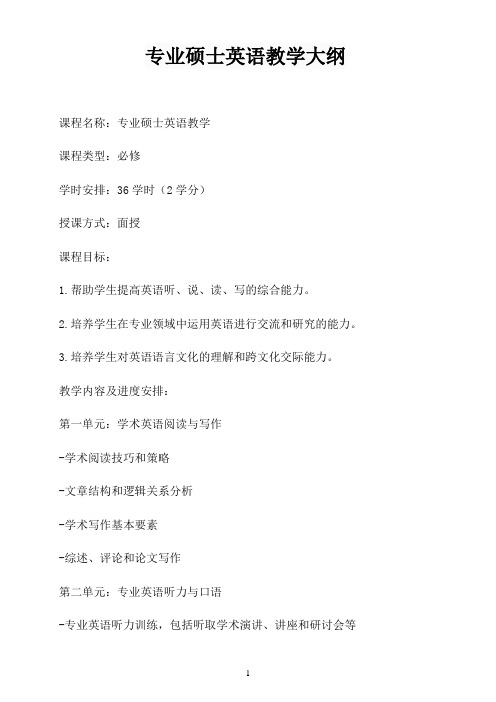
专业硕士英语教学大纲课程名称:专业硕士英语教学课程类型:必修学时安排:36学时(2学分)授课方式:面授课程目标:1.帮助学生提高英语听、说、读、写的综合能力。
2.培养学生在专业领域中运用英语进行交流和研究的能力。
3.培养学生对英语语言文化的理解和跨文化交际能力。
教学内容及进度安排:第一单元:学术英语阅读与写作-学术阅读技巧和策略-文章结构和逻辑关系分析-学术写作基本要素-综述、评论和论文写作第二单元:专业英语听力与口语-专业英语听力训练,包括听取学术演讲、讲座和研讨会等-口语表达技巧和策略,包括学术演讲和讨论技巧-学术报告和演讲实践第三单元:商务英语沟通-商务英语词汇和常用表达-商务英语听力和口语训练,包括商务会议、谈判和演示等-商务信函和报告写作第四单元:跨文化交际与英语社交礼仪-跨文化交际理论和实践-跨文化沟通中的问题与解决策略-英语社交礼仪和常用表达教学方法:1.授课方式:面授讲授2.学生参与:课堂讨论、小组活动和角色扮演等3.多媒体辅助教学:使用投影仪、电脑、录音设备等多媒体设备展示教学资源和案例分析4.课外作业:阅读、听力、写作和口语练习等任务考核方式:1.平时表现:课堂参与、小组讨论和作业完成情况2.期中考试:包括听力、阅读、写作和口语部分3.期末论文:根据学生的研究兴趣和专业背景,撰写一篇与专业相关的英文论文教材与参考书目:主教材:-Academic Writing and Reading Skills,作者:John Smith,出版社:ABC Publishing-Business English Communication,作者:Jane Brown,出版社:XYZ Press 参考书目:-Academic Listening and Speaking,作者:Mary Johnson,出版社:DEF Publishing-Cross-Cultural Communication in Business,作者:David Lee,出版社:GHI Press备注:本教学大纲仅供参考,实际教学中可根据学生的具体情况和教学需求进行适当调整和补充。
MPA英语课程教学大纲
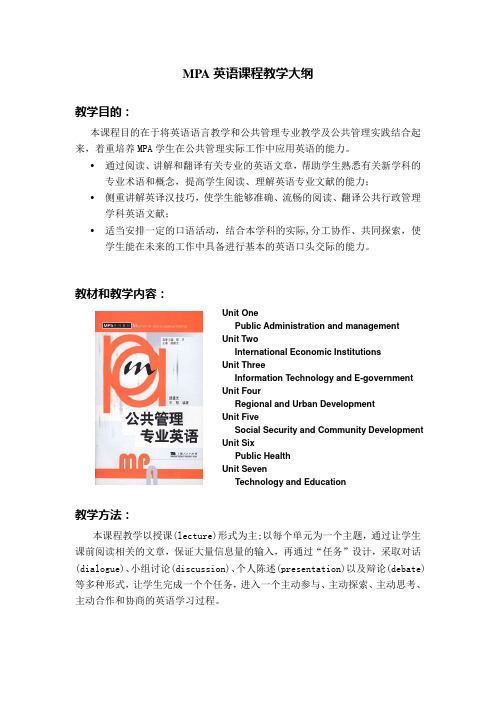
MPA英语课程教学大纲教学目的:本课程目的在于将英语语言教学和公共管理专业教学及公共管理实践结合起来,着重培养MPA学生在公共管理实际工作中应用英语的能力。
•通过阅读、讲解和翻译有关专业的英语文章,帮助学生熟悉有关新学科的专业术语和概念,提高学生阅读、理解英语专业文献的能力;•侧重讲解英译汉技巧,使学生能够准确、流畅的阅读、翻译公共行政管理学科英语文献;•适当安排一定的口语活动,结合本学科的实际,分工协作、共同探索,使学生能在未来的工作中具备进行基本的英语口头交际的能力。
教材和教学内容:Unit OnePublic Administration and managementUnit TwoInternational Economic InstitutionsUnit ThreeInformation Technology and E-governmentUnit FourRegional and Urban DevelopmentUnit FiveSocial Security and Community DevelopmentUnit SixPublic HealthUnit SevenTechnology and Education教学方法:本课程教学以授课(lecture)形式为主;以每个单元为一个主题,通过让学生课前阅读相关的文章,保证大量信息量的输入,再通过“任务”设计,采取对话(dialogue)、小组讨论(discussion)、个人陈述(presentation)以及辩论(debate)等多种形式,让学生完成一个个任务,进入一个主动参与、主动探索、主动思考、主动合作和协商的英语学习过程。
《研究生公共英语》教学大纲
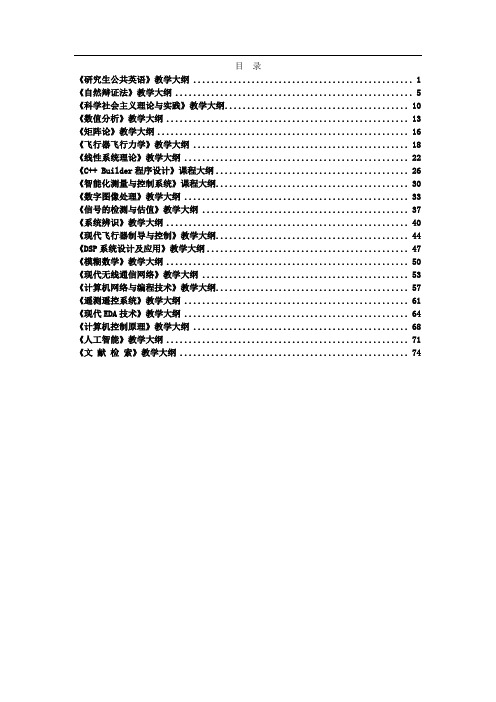
目录《研究生公共英语》教学大纲 (1)《自然辩证法》教学大纲 (5)《科学社会主义理论与实践》教学大纲 (10)《数值分析》教学大纲 (13)《矩阵论》教学大纲 (16)《飞行器飞行力学》教学大纲 (18)《线性系统理论》教学大纲 (22)《C++ Builder程序设计》课程大纲 (26)《智能化测量与控制系统》课程大纲 (30)《数字图像处理》教学大纲 (33)《信号的检测与估值》教学大纲 (37)《系统辨识》教学大纲 (40)《现代飞行器制导与控制》教学大纲 (44)《DSP系统设计及应用》教学大纲 (47)《模糊数学》教学大纲 (50)《现代无线通信网络》教学大纲 (53)《计算机网络与编程技术》教学大纲 (57)《遥测遥控系统》教学大纲 (61)《现代EDA技术》教学大纲 (64)《计算机控制原理》教学大纲 (68)《人工智能》教学大纲 (71)《文献检索》教学大纲 (74)《研究生公共英语》教学大纲Course Outline of English for Postgraduates编写人:万涛审核人:刘冰泉学时:120 学分:6第一部分大纲说明1. 课程代码:050162. 课程类型:学位课3. 课程性质:公共课4. 学时/学分:120/65. 课程目标:研究生英语课程旨在培养研究生的英语综合应用能力,使他们通过本课程的学习,能借助专业词典阅读英语文献,读懂报刊、杂志等上的英语学术论文,从而更快捷地了解和掌握先进的西方文化知识和技术,并能用英语和他人较顺畅地进行交流。
读懂报刊、杂志和各不同专业的学术论文。
6. 教学方式:课堂讲授、自学与讨论相结合7. 考核方式:考试8. 预修课程:教材:(1) 高桂珍,王慧莉主编. 新世纪研究生公共英语教材阅读 A.上海:上海外语教育出版社, 2006(2) Jeo Jones. 大学英语基础口语教程Let’s Talk (2). 上海:上海外语教育出版社, 2005 参考资料:(1) 王同顺主编. 研究生英语系列教程熟谙. 北京: 高等教育出版社, 1999(2) 吴依弟. 研究生英语系列教程. 厦门:厦门大学出版社,2001(3) Miriam Espeseth编著. 高年级英语听说. 上海:上海外语教育出版社,2005(4) 何福胜主编. 研究生英语系列教程进阶听说. 北京: 高等教育出版社, 1999第二部分教学内容和教学要求Unit 1Text: A Y oung Boy’s AmbitionSupplementary Readings: A. A Pound of ButterB. Brave Ballerina教学内容:阅读理解主课文A Young Boy’s Ambition,掌握词汇表中的词汇和课文中重要的句型结构,理解文中语言点。
公共管理专业英语课程教学大纲
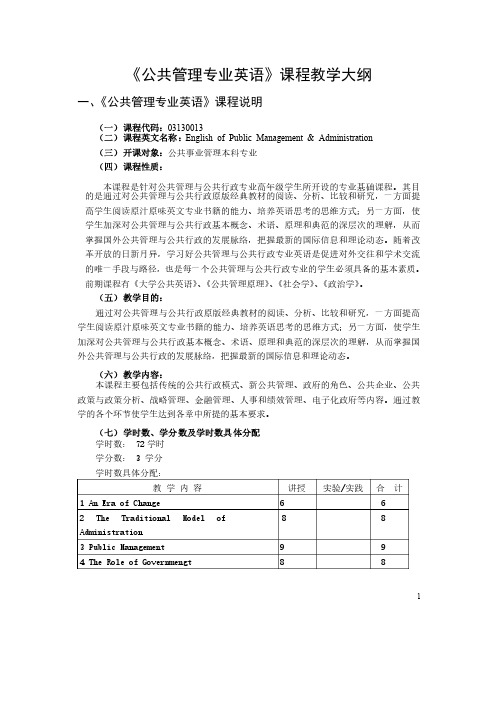
1 《公共管理专业英语》课程教学大纲一、《公共管理专业英语》课程说明(一)课程代码:03130013(二)课程英文名称:English of Public Management & Administration (三)开课对象:公共事业管理本科专业公共事业管理本科专业 (四)课程性质:本课程是针对公共管理与公共行政专业高年级学生所开设的专业基础课程。
其目的是通过对公共管理与公共行政原版经典教材的阅读、分析、比较和研究,一方面提高学生阅读原汁原味英文专业书籍的能力、培养英语思考的思维方式;另一方面,使学生加深对公共管理与公共行政基本概念、术语、原理和典范的深层次的理解,从而掌握国外公共管理与公共行政的发展脉络,把握最新的国际信息和理论动态。
随着改革开放的日新月异,学习好公共管理与公共行政专业英语是促进对外交往和学术交流的唯一手段与路径,的唯一手段与路径,也是每一个公共管理与公共行政专业的学生必须具备的基本素质。
也是每一个公共管理与公共行政专业的学生必须具备的基本素质。
前期课程有《大学公共英语》、《公共管理原理》、《社会学》、《政治学》。
(五)教学目的:通过对公共管理与公共行政原版经典教材的阅读、分析、比较和研究,一方面提高学生阅读原汁原味英文专业书籍的能力、培养英语思考的思维方式;另一方面,使学生加深对公共管理与公共行政基本概念、术语、原理和典范的深层次的理解,从而掌握国外公共管理与公共行政的发展脉络,把握最新的国际信息和理论动态。
(六)教学内容:本课程主要包括传统的公共行政模式、新公共管理、政府的角色、公共企业、公共政策与政策分析、战略管理、金融管理、人事和绩效管理、电子化政府等内容。
通过教学的各个环节使学生达到各章中所提的基本要求。
(七)学时数、学分数及学时数具体分配 学时数:学时数: 72 72学时学时 学分数:学分数: 3 3 3 学分学分学分 学时数具体分配:学时数具体分配:教 学 内 容讲授讲授 实验实验//实践实践 合 计计 1 An Era of Change6 6 2 The Traditional Model of Administration 883 Public Management 9 94 The Role of Governmengt885 Public Enterprise6 66 Public Policy and Policy9 9 Analysis7 Strategic Management 7 75 5 8 Personnel and PerformanceManangement9 Financial Manangement 6 610 E-goverment 8 872计7合合 计23 Chapter Two Two::The Traditional Model of Public Administration教学要点:1. Early administration 2. The reforms of the nineteenth century 3. Weber ’s theory of bureaucracy 4. Wilson and political control 5. Taylor and management 6.Problems with the traditional model 教学时数:8学时 教学内容:1.Introduction 2.Early administration 3.The reforms of the nineteenth century 4.Weber ’s theory of bureaucracy 5.Wilson and political control 6.Taylor and management 7.Problems with the traditional model 8.Conclusion 考核要点:1.Early administration (了解)2.The reforms of the nineteenth century (了解) 3.Weber ’s theory of bureaucracy (识记) 4.Wilson and political control (识记) 5.Taylor and management (识记)(识记)(识记) 6.Problems with the traditional model (领会)Chapter Three Chapter Three::Public Management教学要点:1. The meaning of management 2. Functions of general management 3. The beginnings of a management approach 4. The public management reforms 5. The managerial programme 6. Theoretical bases of management 7. Criticisms of manageriallism 4 教学时数:9学时 教学内容:1.Introduction 2.The meaning of management 3. Functions of general management 4. The beginnings of a management approach 5. The public management reforms 6. The managerial programme 7. Theoretical bases of management 8. Criticisms of manageriallism 9. Conclusion 考核要点:1.The meaning of management 2.Functions of general management 3.The beginnings of a management approach 4.The public management reforms 5.The managerial programme 6.Theoretical bases of management 7.Criticisms of manageriallismChapter Four Chapter Four::The Role of Government教学要点:1. The need for a public sector 2. Market failure as the basis for public policy 3. Instruments of government 4. Phases of government intervention 5. Basic functions of government 6. The size of government debate教学时数:8学时教学内容:1.Introduction 2.The need for a public sector 3.Market failure as the basis for public policy 4.Instruments of government 5.Phases of government intervention 6.Basic functions of government 5 7.The size of government debate 8.Conclusion 考核要点:1.The need for a public sector (了解)2.Market failure as the basis for public policy(领会) 3.Instruments of government (领会) 4.Phases of government intervention (领会) 5. Basic functions of government (识记)(识记)6. The size of government debate (领会) Chapter Five Chapter Five::Public Enterprise教学要点:1. Kinds of public enterprise 2. The privatization debate 3. Control and accountability教学时数:6学时 教学内容:1.Introduction 2.Reasons for establishing public enterprise 3.Kinds of public enterprise 4.The privatization debate 5.Control and accountability 6.Conclusion: the future of public enterprise 考核要点:1.Kinds of public enterprise (识记)(识记) 2.The privatization debate (领会)(领会)(领会) 3.Control and accountability (领会)(领会) Chapter Six Chapter Six::Public Policy and Policy Analysis教学要点:1. Public policy, administration and management 2. Policy analysis 3. Empirical methods 4. Policy process models 5. Limitations of the policy analysis approach教学时数:9学时 教学内容:6 1.Introduction 2.Public policy, administration and management 3.Policy analysis 4.Empirical methods 5.Policy process models 6. Limitations of the policy analysis approach 7. Responses to criticism 8. Political public policy 9. Conclusion 考核要点:1. Public policy, administration and management Public policy, administration and management(识记)(识记)(识记) 2. Policy analysis Policy analysis(领会)(领会)(领会) 3. Empirical methods Empirical methods(运用)(运用)(运用)4. Policy process models Policy process models(领会)(领会)(领会) 5. Limitations of the policy analysis approach Limitations of the policy analysis approach(了解)(了解)Chapter Seven Chapter Seven::Strategic Management教学要点:1. Strategy in the private sector 2. Strategy in the public sector 3. Strategic planning model 4. Strategic management教学时数:7学时 教学内容:1.Introduction 2.Strategy in the private sector 3.Strategy in the public sector 4.Strategic planning model 5.Strategic management 6.Criticisms 7.Conclusion 考核要点:1. Strategy in the private sector Strategy in the private sector(了解)(了解)(了解) 2. Strategy in the public sector Strategy in the public sector(了解)(了解)(了解) 3. Strategic planning model Strategic planning model(领会)(领会)(领会)7 4. Strategic management Strategic management(识记)(识记)(识记)Chapter Eight Personanel and Performance Management教学要点:1.1. Personnel Management2.2. Performance management 教学时数:5学时 教学内容:1.Introdution2.Personnel Management3.3. Performance management4.4. Some problems of the personnel and performeace change5.5. Conlusion考核要点:1.Personnel Management(1.Personnel Management(识记识记识记) )2.Performance management 2.Performance management(识记)(识记)(识记)Chapter Nine Finacial Management教学要点:1. T he Government budget2. T raditional financial management3. F inacial management and public sector reform 教学时数:6学时 教学内容: 1.Introduction2.The Government budget3.Traditional financial management4. F inacial management and public sector reform 5. C riticisms of financial reforms 6. C onclusion 考核要点:1.The Government budget 1.The Government budget(领会)(领会)(领会)2.Traditional financial management 2.Traditional financial management(领会)(领会)(领会)3.Finacial management and public sector reform 3.Finacial management and public sector reform(识记)(识记)(识记)Chapter Ten E-government教学要点:1.1. Technology and the administration8 2.2. The beginning of e-government3.3. E-government stages4.4. The impact of technological change on bureaucracy5.5. E-government and the public management reforms 教学时数:8学时 教学内容:1.Introduction2.Technology and the administration3.The beginning of e-government4.E-government stages5.The impact of technological change on bureaucracy6.6. E-government and the public management reforms7.7. Problems of e-government8.8. Conclusion考核要点:1.Technology and the administration 1.Technology and the administration(识记)(识记)(识记)2.The beginning of e-government 2.The beginning of e-government(了解)(了解)(了解)3.E-government stages 3.E-government stages(了解)(了解)(了解)4.The impact of technological change on bureaucracy 4.The impact of technological change on bureaucracy(领会)(领会)(领会)5.E-government and the public management reforms 5.E-government and the public management reforms(了解)(了解)(了解)三 、推荐教材和参考书目1.Owen E.Hughes, A Public Management and Administration: An Introduction2.The Merriam-Webster Dictionary 3 3../oco/ocos060.htm (曹卫平撰)(曹卫平撰)(曹卫平撰)。
- 1、下载文档前请自行甄别文档内容的完整性,平台不提供额外的编辑、内容补充、找答案等附加服务。
- 2、"仅部分预览"的文档,不可在线预览部分如存在完整性等问题,可反馈申请退款(可完整预览的文档不适用该条件!)。
- 3、如文档侵犯您的权益,请联系客服反馈,我们会尽快为您处理(人工客服工作时间:9:00-18:30)。
《MPA高级英语》教学大纲(行政班)课程代码:课程名称:高级英语英文名称:Public Management and Administration:An Introduction课程性质:学分学时:Credits: 3; 32 Hours授课对象:(说明专业年级)MPA 行政班课程简介:This course provides an introduction to, and assessment of, the theories and principles of public management, particularly the public sector reformsassociated with the movement most often referred to as "the new publicmanagement" and compares and contrasts these with the traditionalmodel of public administration.先修课程:N/A选用教材:公共管理导论(Public Management and Administration:An Introduction)考核方式与成绩评定:考试方式:论文;出勤10%、平时30%、期末成绩60%主讲教师:吴爱华所属院系:公共管理学院第一章 An Era of Change教学目标和要求:Paradigm and Paradigm Shift: public administration and publicmanagement教学时数:4 hours教学方式:delivery and discussion准备知识:new public management教学内容:(contents)1.the Emergency of a new paradigm in the public sector;2.fundamental principles of traditional public administration;3.administration and management;4.imperatives of change作业与思考题:What is a new paradigm?what are i mperatives of change?第二章 the Traditional Model of public Administration 教学目标和要求:to understand the traditional model of public administration; to understand problems with the traditional model教学时数:4 hours教学方式:delivery and discussion准备知识:Wilson, Taylor and Weber theories教学内容:(contents)1.the evolution of public administration;2.the reform of public administration in the nineteenth century;3.the problem of political control4.the problem of one best way;5.the problem of bureaucracy;6.the public choice critique作业与思考题:What are the problems with traditional model of public administration?第三章 Public Management教学目标和要求:to understand Management and Management approach;to understand managerialism in public sector教学时数:4 hours教学方式:delivery and discussion准备知识:management and functions of general management教学内容:(contents)1.the meaning of management;2.the Management Approach;3.the public management reforms;4. theoretical bases of management;5.criticisms of managerialism作业与思考题:What is managerialism and managerial approach?第四章 the Role of Government教学目标和要求:to understand the role of government;to understand instruments of to understand basic functions of government教学时数:4 hours教学方式:delivery and discussion准备知识:government and its functions教学内容:(contents)1.the need for a public sector;2.market failure as basis for public policy;3.instruments of government;4.basic functions of government5.the size of government debate作业与思考题:What are the instruments of government? what are the basic functions of government?第五章 Public Policy and Policy Analysis教学目标和要求:to understand public policy and policy analysis;to understand two approaches of public policy;to understand the relationship between public policy and administration and management教学时数:4 hours教学方式:delivery and discussion准备知识:empirical methodology;inductive and deductive method教学内容:(contents)1.public policy,administration and management;2.policy analysis;3.empirical methods4.policy process models5.limitations of the policy analysis approach6.political public policy作业与思考题:What is public policy and policy analysis? what are the two public policy approaches?How is a policy processed?第六章 Public Management in Developing Countries 教学目标和要求:to understand whether managerialism is applicable in developing countries, to understand the traditional model in developing countries;to understand the public management reforms in developing countries教学时数:4 hours教学方式:delivery and discussion准备知识:the public administration in developing countries教学内容:(contents)1.the traditional public administration model in developing countries;2.problems of the administrative model;3.the public management reforms in developing countries4.problems of the managerial model in developing countires作业与思考题:Is managerialism applicable in developing countries?第七章 Accountability教学目标和要求:to understand the meaning of accountability;to understand accountability in both public and private sector;to understand a managerial model of accountability and its problems教学时数:4 hours教学方式:delivery and discussion准备知识:managerial accountability教学内容:(contents)1.accountability in the private sector;2.accountability in the public sector;3.accountability in the traditional model;4. a managerial model of accountability;5.accountability problems of the managerial model作业与思考题:What are the accountability problems of the managerial model?第八章 A New Paradigm for Public Management 教学目标和要求:to understand the public Management paradigm;to understand an international movement in public Management;to understand the ideological basis of managerialism;to understand public management as an academic discipline 教学时数:4 hours教学方式:delivery and discussion准备知识:public management as an academic discipline教学内容:(contents)1. a paradigm shift or not;2.An international movement;3.the ideological basis of managerialism;4.the impact of democracy;5.public management as an academic discipline作业与思考题:Can traditional public administration and public management be considered paradigms?。
